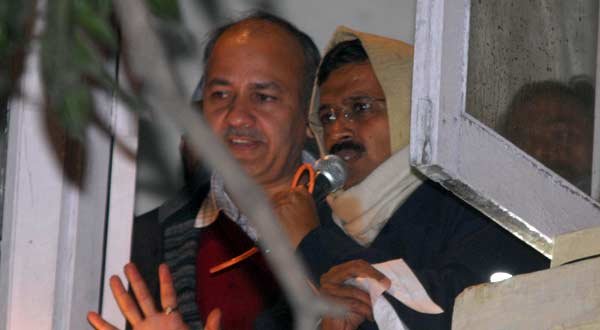By Amulya Ganguli
Since theatrics have been an integral feature of Arvind Kejriwal’s politics, his resignation as Delhi’s chief minister can be seen as part of a choreographed performance.
Having shaken off the burden of office – a responsibility for which he appeared to be temperamentally unfit – Kejriwal can now be expected to assume the role which comes naturally to him, that of a street-level agitator.
It goes without saying that as a rabble-rouser, he will be far more successful than what he was as a chief minister. Moreover, he will be able to flaunt his inability to continue as the head of a government by presenting himself as the victim of an unscrupulous set of opponents.
The Aam Admi Party (AAP) leader is aware that to large sections, especially among the subaltern classes, he is something of a messiah, who is bent on cleansing the Augean stables of politics. As he told the Delhi assembly in his farewell speech, he is willing to lay down his life while fighting corruption.
Following his resignation, he will be able to claim that he was prevented by the Congress, the Bharatiya Janata Party (BJP) and the industrialist Mukesh Ambani to achieve his avowed objective. Since his claim will find considerable resonance – if he is able to keep some of his more enthusiastic camp-followers like former law minister Somnath Bharti in check – then it will not be a wild guess to say that the AAP may be able to secure a majority of its own in the next assembly elections in Delhi.
In the parliamentary polls, too, the AAP’s tally of seats may go up from the present estimate of 20-odd to 40 or so. Such an outcome will result in furrowed brows among the BJP top brass because the AAP is likely to gain mainly at the BJP’s expense since their vote banks – the Hindu urban middle class – are largely the same.
It is not impossible, therefore, that the latest turn of events is the result of the Congress’s decision to fire at the BJP from the AAP’s shoulder. Since the Congress is in no position in its current demoralized state to take on the BJP, why not let the more gung-ho AAP do the job for it ?
Indeed, the decision to prop up the AAP in the assembly must have been a part of this cynical game plan. And, now, even if Kejriwal acquires the halo of a martyr on the issue of the Jan Lokpal bill, he will be serving the Congress’s cause by eroding the BJP’s base. The Congress is probably also aware that it is the BJP which poses a long-term danger, and not the AAP.
Even if the AAP comes to power on its own in Delhi, the chances are that its belligerent ways will cut short its stint. As the party’s propensity to adopt a confrontationist posture towards all and sundry – from the Lt. Governor, whom it called a Congress agent, to Ambani – showed, its holier-than-thou self-image leaves little room for compromise.
Its outlook is also skewed, comprising left-of-centre economics (no to foreign investment in retail) and right-of-centre sociology (yes to khap panchayats, community courts in Haryana’s villages). It will be a miracle, therefore, if it can run a government without being engaged in constant skirmishes with other stake-holders.
For the present, however, the AAP is back where it feels at home – the street. But, there is a disadvantage. While Kejriwal’s oratorical skills and disdain for the norms of not making personal charges are bound to draw large crowds, he will have to be careful about not repeating the earlier exercise in staging dharnas (sit-ins) lest the resultant disruptions revive the allegations of being an anarchist.
It is this reputation which has disenchanted a section of the middle class, inducing admirers like the former diplomat Madhu Bhaduri, a founder member, to leave the party and corporate entrepreneur Captain G.R. Gopinath, who set up the new-defunct Air Deccan, to distance himself from the party.
As it is, Kejriwal is courting danger with his various allegations because he may well become entangled in several court cases for defamation. It is no secret that from the time of Anna Hazare’s agitation, neither the guru nor the estranged ‘shishya’ (disciple) has been unable to substantiate their charges against suspected villains in the establishment in any court of law.
If Kejriwal has nevertheless been able to get away with his targeting of ministers and businessmen, the reason is the widespread sense of disillusionment and anger against the government at the centre for not only the existing corruption at various levels – from the lowly constable to high officials, politicians and crony capitalists – but also the government’s seeming unwillingness to act against the guilty, including those with black money in foreign banks.
It is obviously the government’s apathy and culpability which have enabled the anti-corruption crusaders to gain ground. But, there have been other holy warriors before Kejriwal – V.P. Singh was a notable example and Jayaprakash Narayan before him – who started with a bang but ended in a whimper.
The next few months will show whether Kejriwal will go down the same road or prove to be a genuine knight in shining armour. — IANS

